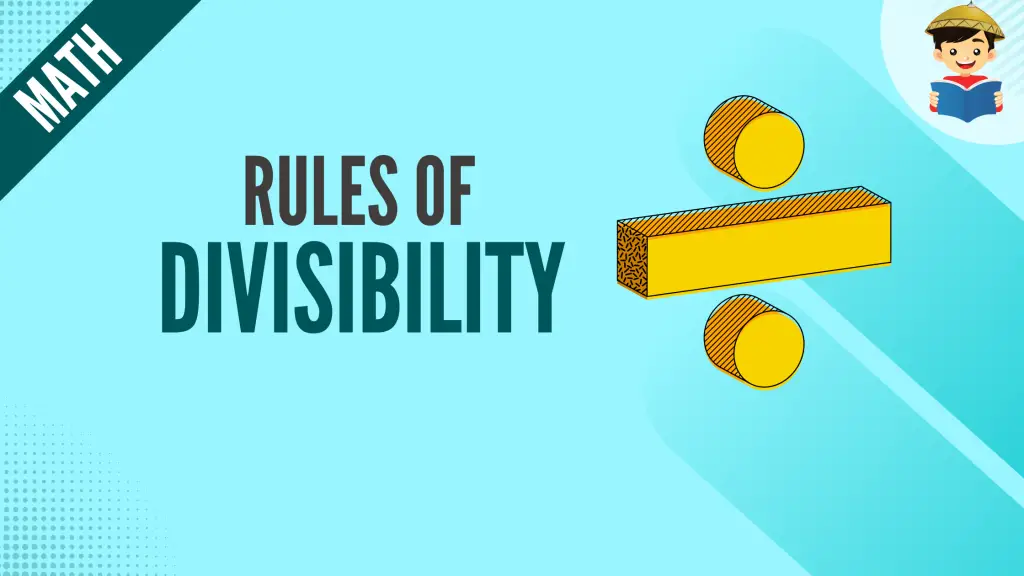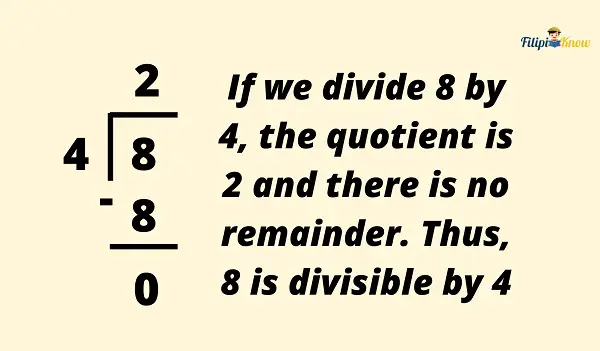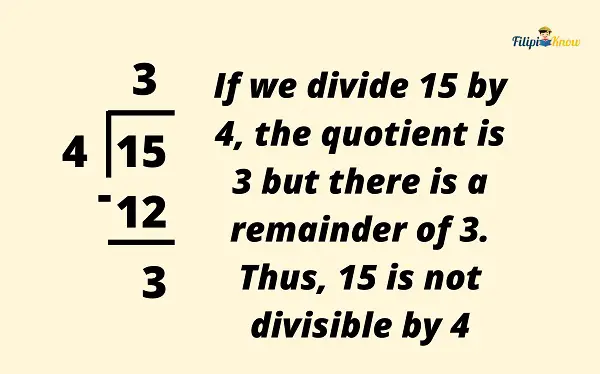Divisibility Rules With Examples

Did you know you can determine whether a number will give you a remainder when divided by another number without performing an actual division?
There’s no magic involved! The only trick is to apply the divisibility rules.
Are you ready to learn the tricks? Let’s discuss these rules one by one in this review.
Click below to go to the main reviewers:
Ultimate Civil Service Exam Reviewer
Ultimate PMA Entrance Exam Reviewer
Ultimate PNP Entrance Exam Reviewer
Table of Contents
What Does “Divisible” Mean?
Let’s start by defining the word “divisible.”
A number is divisible by a certain number if it can be divided by the latter and leaves no remainder.
For example, eight is divisible by four since when you divide eight by 4, the answer is 2, and there is no remainder.

On the other hand, 15 is not divisible by four since when you divide 15 by 4, the answer is 3, but there is a remainder of 3.

Divisibility Rules
Divisibility rules are the rules that you can use to determine if one number is divisible by another. The good thing about these divisibility rules is that you don’t have to perform the actual long division process to determine whether the number is divisible by a certain number or not.
All you have to do is to apply these rules.
Let us explore these rules one by one
Divisibility Rule for 1: All integers are divisible by 1
This is just common sense. If you divide any number by 1, the result is the same number, and there’s no remainder. Therefore, every number is divisible by 1.
Divisibility Rule for 2: An integer is divisible by two if and only if its last digit is even (0, 2, 4, 6, and 8)
Recall that even numbers can be divided by two without a remainder. The even number digits are 0, 2, 4, 6, and 8.
If the last digit of a number is an even number, then that number is divisible by 2. For example, 30826 is divisible by two since the last digit of 30826 is 6, which is an even number.
Example 1: Is 45034 divisible by 2?
Yes, 45034 is divisible by two since its last digit is an even number, 4.
Example 2: Is 10987 divisible by 2?
No, the last digit of 10987 is 7, which is not an even number. Hence, 10987 is not divisible by 2.
Divisibility Rule for 3: An integer is divisible by three if and only if the sum of its digits is divisible by 3
To determine if a number is divisible by 3, add the digits of the number and then divide the sum by 3. If the answer has no remainder, the number is divisible by 3.
Example 1: Is 3438 divisible by 3?
Add the digits of 3438: 3 + 4 + 3 + 8 = 18
When you divide 18 by 3, the answer is 6, with no remainder.
Therefore, 3438 is divisible by 3.
Example 2: Is 5422 divisible by 3?
Add the digits of 5422: 5 + 4 + 2 + 2 = 13
When you divide 13 by 3, the answer is 4, but there’s a remainder of 1.
Hence, 5422 is not divisible by 3
Divisibility Rule for 4: An integer is divisible by four if and only if its last two digits are divisible by 4
If the last two digits of the given number leave no remainder when divided by 4, then the given number is divisible by 4.
Example 1: Does 3,400,280 leave the remainder when divided by 4?
The last two digits of 3,400,280 are 80. When we divide 80 by 4, the result is 20, with no remainder. Therefore, 3,400,280 is divisible by 4.
Example 2: Is 54230 divisible by 4?
The last two digits of 54230 are 30, which are not divisible by 4. Therefore, 54230 is not divisible by 4.
Example 3: What are the possible values of A so that 341A is divisible by 4?
If 341A is divisible by 4, then the last two digits, which are 1A must be divisible by 4. What must be the value of A so that 1A is divisible by 4?
Note that 12 and 16 are divisible by 4 (since they are multiples of 4 also). Therefore, the possible values of A are 2 and 6.
Divisibility Rule for 5: An integer is divisible by five if and only if its last digit is 0 or 5
This is the easiest among the divisibility rules. Once you see the last digit of a number is 0 or 5, that number is divisible by 5.
For instance, 45005 is divisible by five since the last digit of 45005 is 5.
132000000 is also divisible by five since the last digit of 132000000 is 0.
On the other hand, 15723122 is not divisible by five since its last digit is neither 0 nor 5.
Example 1: If A is a nonzero positive whole number, what must be the value of A so that 3214A is divisible by 5?
A number is divisible by five if its last digit is 0 or 5. Hence, the last digit of 3214A must be 0 or 5 to be divisible by 5. Then, A can either be 0 or 5. However, the problem stated that A must be nonzero. Therefore, A must be equal to 5.
Divisibility Rule for 6: An integer is divisible by six if and only if it is even and divisible by 3
There are two things you need to consider to determine whether a number is divisible by six or not:
- Is the given number an even number (or divisible by 2)?
- Is the given number divisible by 3?
If one of these conditions is not met, then the number is not divisible by 6.
Example 1: Is 1932 divisible by 6?
Using the divisibility rule for 6:
- Is the given number an even number? Yes, 1932 is an even number since it is divisible by 2 (the last digit of 1932 is 2, which is an even number).
- Is the given number divisible by 3? Yes, because the sum of the digits of 1932 is 1 + 9 + 3 + 2 = 15, and 15 is divisible by 3.
Since both conditions are met, then 1932 is divisible by 6.
Example 2: Is 41024 divisible by 6?
Using the divisibility rule for 6:
- Is the given number an even number? Yes, 41024 is an even number since it is divisible by 2 (the last digit of 41024 is four which is an even number).
- Is the given number divisible by 3? No, because the sum of digits of 41024 is 4 + 1 + 0 + 2 + 4 = 11, and 11 is not divisible by 3.
Since one of the conditions is not met, 41024 is not divisible by 6.
Divisibility Rule for 7: An integer is divisible by seven if and only if the difference between the number made by the other digits of the integer and twice the last digit of the integer is divisible by 7
To determine if a number is divisible by 7, follow these steps:
- Double the last digit of the integer.
- Subtract the number you obtained in Step 1 from the number made by the other digits.
- Determine if the resulting number you obtained in Step 2 is divisible by 7. If the resulting number is divisible by 7, then the original number is divisible by 7.
Example 1: Is 294 divisible by 7?
- Double the last digit of the integer.
The last digit of 294 is 4. Now, let’s double 4: 4 × 2 = 8
- Subtract the number you obtained in Step 1 from the number made by other digits.
The number we obtained from Step 1 was 8. The number made by the other digits is 29. We subtract eight from 29: 29 – 8 = 21
- Determine if the resulting number you obtained in Step 2 is divisible by 7. If the resulting number is divisible by 7, then the original number is divisible by 7.
21 is divisible by seven since 21 divided by seven is three and has no remainder. Hence, 294 is divisible by 7.
Divisibility Rule for 8: An integer is divisible by eight if and only if its last three digits are divisible by 8
To determine if a number is divisible by 8, get the last three digits of the given number and then divide it by 8. If the result has no remainder, then the original number is divisible by 8
Example 1: Is 1192 divisible by 8?
The last three of the given number are 192. Dividing 192 by eight will provide you with 24, and it has no remainder. Therefore, the original number, 1192, is divisible by 8.
Divisibility Rule for 9: An integer is divisible by nine if and only if the sum of its digits is divisible by 9
To determine if a number is divisible by 9, add the digits of the given number. Afterward, divide the resulting number by 9. If the result has no remainder, the original number is divisible by 9.
Example 1: Is 3294 divisible by 9?
Add the digits of the given number: 3 + 2 + 9 + 4 =18
Divide the resulting number by 9: 18 ÷ 9 = 2. There’s no remainder.
Therefore, 3294 is divisible by 9.
BONUS: Division by Zero (0)
How about 0?
Which numbers are divisible by 0?
No such number is divisible by 0 because division by 0 is undefined. For example, no number in the set of real numbers can answer two divided by 0.
Any number divided by 0 is undefined. Meanwhile, if you divide 0 by itself or 0 divided by 0, the answer is indeterminate.
Next topic: Fractions and Decimals
Previous topic: Factors and Multiples
Return to the main article: The Ultimate Basic Math Reviewer
Download Printable Summary/Review Notes
Download Printable Flashcards
Test Yourself!
1. Practice Questions [Free PDF Download]
2. Answer Key [Free PDF Download]
3. Math Mock Exam + Answer Key
Written by Jewel Kyle Fabula
in Civil Service Exam, College Entrance Exam, LET, NAPOLCOM Exam, NMAT, PMA Entrance Exam, Reviewers, UPCAT
Jewel Kyle Fabula
Jewel Kyle Fabula is a Bachelor of Science in Economics student at the University of the Philippines Diliman. His passion for learning mathematics developed as he competed in some mathematics competitions during his Junior High School years. He loves cats, playing video games, and listening to music.
Copyright Notice
All materials contained on this site are protected by the Republic of the Philippines copyright law and may not be reproduced, distributed, transmitted, displayed, published, or broadcast without the prior written permission of filipiknow.net or in the case of third party materials, the owner of that content. You may not alter or remove any trademark, copyright, or other notice from copies of the content. Be warned that we have already reported and helped terminate several websites and YouTube channels for blatantly stealing our content. If you wish to use filipiknow.net content for commercial purposes, such as for content syndication, etc., please contact us at legal(at)filipiknow(dot)net